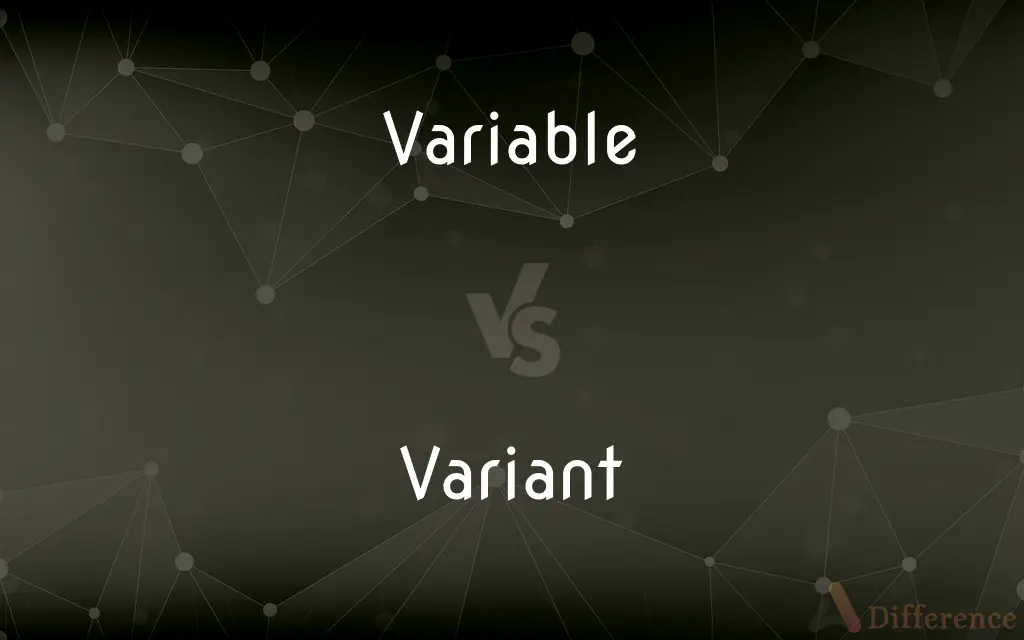Variable vs. Variant — What's the Difference?
Edited by Tayyaba Rehman — By Maham Liaqat — Updated on March 14, 2024
A variable is a symbol or name representing a value that can change, while a variant is a version of something that differs in some way from other versions.

Difference Between Variable and Variant
Table of Contents
ADVERTISEMENT
Key Differences
A variable, in programming and mathematics, represents a value that can change or vary. It is a fundamental concept used to store data that may be modified during the execution of a program. Whereas a variant is often used to describe a particular form or version of something that exhibits differences in characteristics, features, or attributes from other forms of the same entity.
Variables are essential in algorithms and coding, allowing for the manipulation of data and the implementation of logic. They can hold numbers, text, or more complex data structures. On the other hand, variants are more about diversity and options within a category, such as different versions of a software product, genetic variations among species, or variations of a product line.
In programming, a variable's data type can dictate the kind of data it can hold and the operations that can be performed on it. While in the context of products or genetics, a variant represents a specific difference within a broader category, highlighting diversity or evolutionary adaptation.
Variables are named locations in memory where data is stored, and their values can be updated or changed as needed. This makes them dynamic and adaptable to various programming scenarios. Conversely, variants denote specific alternatives or options within a category, emphasizing the existence of multiple possibilities or forms.
Variables play a critical role in the control flow of a program, enabling dynamic responses to user input, computational results, or changes in the program's environment. Variants, however, are more about providing choices or acknowledging the existence of different forms or options within a defined scope or category.
ADVERTISEMENT
Comparison Chart
Definition
A symbol representing a value that can change.
A version of something that differs in some way.
Context
Programming, mathematics.
Genetics, product lines, software versions.
Role
Facilitates data manipulation and dynamic programming.
Represents diversity or alternatives.
Nature
Dynamic and changeable.
Static, emphasizing differences.
Application Example
Storing a user's age in a software program.
Different flavors of a soft drink.
Compare with Definitions
Variable
A storage location named by a symbolic name that contains a value which can change.
In Python, the variable age can be assigned the value 30.
Variant
A form or version of something that differs in some respect from other forms of the same thing or from a standard.
The delta variant of the virus showed increased transmissibility.
Variable
An element, feature, or factor that is liable to vary or change.
Weather conditions are a significant variable in crop production.
Variant
A specific variation of a product offered in addition to the standard model.
The sport variant of the car comes with a turbocharged engine.
Variable
In mathematics, a symbol that represents an unspecified number or value.
In the equation x + 2 = 5, x is a variable.
Variant
In genetics, a variation in the sequence of a gene.
That genetic variant is associated with a higher risk of disease.
Variable
A factor in an experiment that can be changed or controlled.
In a plant growth experiment, the amount of water given is a variable.
Variant
An item of data or a feature that may vary among individuals.
Each variant of the smartphone comes with a different storage capacity.
Variable
A property or characteristic that can take on different values.
The variable of interest in the study was age.
Variant
An alternative spelling, form, or version.
The British variant of the word color is colour.
Variable
Likely to change or vary; subject to variation; changeable.
Variant
An event that departs from expectations
Variable
Inconstant; fickle.
Variant
Differing from others of the same kind or from a standard
A variant form of the disease.
A book in variant editions.
Variable
(Biology) Tending to exhibit genetic variation or variation in a physical trait
Geographically variable color patterns.
Variant
Having or exhibiting variation; varying
A procedure producing variant results.
Variable
(Mathematics) Having no fixed quantitative value.
Variant
Something that differs from others of the same kind or from a standard, as a different spelling or pronunciation of a word.
Variable
Something that varies or is prone to variation.
Variant
Showing variety, diverse.
Variable
(Astronomy) A variable star.
Variant
Showing deviation or disagreement.
Variable
A quantity capable of assuming any of a set of values.
Variant
(obsolete) Variable.
Variable
A symbol representing such a quantity. For example, in the expression a2 + b2 = c2, a,b, and c are variables.
Variant
(programming) Covariant and/or contravariant.
Variable
Able to vary or be varied.
Variable winds or seasons; a variable quantity; a variable resistor
Variant
Something that is slightly different from a type or norm.
All breeds of dog are variants of the species “Canis lupus familiaris”.
The word "kerosine" is a variant of “kerosene”.
Variable
Likely to vary.
Variant
(genetics) A different sequence of a gene (locus).
Variable
Marked by diversity or difference.
Variant
(computing) A variable that can hold any of various unrelated data types.
Variable
(mathematics) Having no fixed quantitative value.
Variant
One of a set of words or other linguistic forms that conveys the same meaning or serves the same function.
Variable
(biology) Tending to deviate from a normal or recognized type.
Variant
Varying in form, character, or the like; variable; different; diverse.
Variable
Something that is variable.
Variant
Changeable; changing; fickle.
He is so variant, he abit [abides] nowhere.
Variable
Something whose value may be dictated or discovered.
There are several variables to consider here.
Variant
Something which differs in form from another thing, though really the same; as, a variant from a type in natural history; a variant of a story or a word.
Variable
(mathematics) A symbol representing a variable.
Variant
(biology) a group of organisms within a species that differ in trivial ways from similar groups;
A new strain of microorganisms
Variable
(programming) A named memory location in which a program can store intermediate results and from which it can read them.
Variant
A variable quantity that is random
Variable
(astronomy) A variable star.
Variant
Something a little different from others of the same type;
An experimental version of the night fighter
An emery wheel is a modern variant of the grindstone
The boy is a younger edition of his father
Variable
(nautical) A shifting wind, or one that varies in force.
Variant
Differing from a norm or standard;
A variant spelling
Variable
Those parts of the sea where a steady wind is not expected, especially the parts between the trade-wind belts.
Variable
Having the capacity of varying or changing; capable of alternation in any manner; changeable; as, variable winds or seasons; a variable quantity.
Variable
Liable to vary; too susceptible of change; mutable; fickle; unsteady; inconstant; as, the affections of men are variable; passions are variable.
Lest that thy love prove likewise variable.
His heart, I know, how variable and vain!
Variable
That which is variable; that which varies, or is subject to change.
Variable
A quantity which may increase or decrease; a quantity which admits of an infinite number of values in the same expression; a variable quantity; as, in the equation x2 - y2 = R2, x and y are variables.
Variable
A shifting wind, or one that varies in force.
Variable
Something that is likely to vary; something that is subject to variation;
The weather is one variable to be considered
Variable
A quantity that can assume any of a set of values
Variable
A star that varies noticeably in brightness
Variable
A symbol (like x or y) that is used in mathematical or logical expressions to represent a variable quantity
Variable
Liable to or capable of change;
Rainfall in the tropics is notoriously variable
Variable winds
Variable expenses
Variable
Marked by diversity or difference;
The varying angles of roof slope
Nature is infinitely variable
Variable
(used of a device) designed so that a property (as e.g. light) can be varied;
A variable capacitor
Variable filters in front of the mercury xenon lights
Common Curiosities
How are variables used in programming?
In programming, variables are used to store, modify, and retrieve data throughout the execution of a program.
What does variant mean?
A variant refers to a version or form of something that exhibits differences from other forms or the standard.
Are variants always related to products?
No, variants can relate to genetics, languages, products, and more, representing differences within a category.
How does a variable influence programming?
Variables allow for flexibility and dynamic changes in a program's execution, facilitating data storage and manipulation.
Can the value of a variable remain constant?
While the concept of a variable implies change, in certain contexts, its value can remain constant once set, but this is more typically referred to as a constant rather than a variable.
What is a variable?
A variable is a symbolic name representing a value that can change in programming and mathematical contexts.
How do variants affect product choice?
Variants provide consumers with choices, catering to different preferences and needs within the same product line.
Can variants exist in software versions?
Yes, software variants represent different versions or editions of software, often differing in features or functionalities.
What is an example of a variant?
An example of a variant is a different flavor of a soft drink, offering a choice from the standard version.
Can a variable have any type of data?
The type of data a variable can hold depends on the programming language and the variable's defined data type.
Is a variable the same as a constant?
No, a variable is intended to hold values that may change, while a constant holds a value that is not meant to be altered once set.
What distinguishes a variant from the standard version?
A variant differs from the standard version in specific characteristics, features, or attributes, offering an alternative.
What role do variants play in genetics?
In genetics, variants represent differences in the DNA sequence among individuals, contributing to genetic diversity.
Why are variables important in experiments?
Variables are crucial in experiments for testing hypotheses and understanding the effects of one factor on another.
Are all variants created intentionally?
While many variants, like product or software versions, are created intentionally, genetic variants can occur naturally through mutation.
Share Your Discovery

Previous Comparison
Smiling vs. Grin
Next Comparison
Fairy vs. WitchAuthor Spotlight
Written by
Maham LiaqatEdited by
Tayyaba RehmanTayyaba Rehman is a distinguished writer, currently serving as a primary contributor to askdifference.com. As a researcher in semantics and etymology, Tayyaba's passion for the complexity of languages and their distinctions has found a perfect home on the platform. Tayyaba delves into the intricacies of language, distinguishing between commonly confused words and phrases, thereby providing clarity for readers worldwide.














































